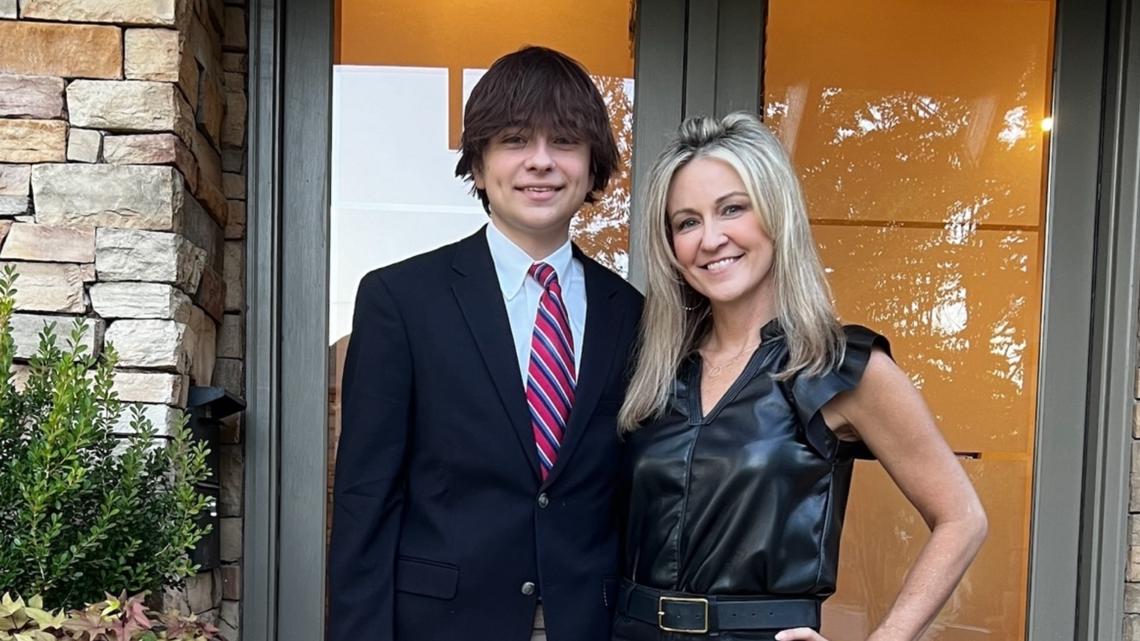“No one can ever understand what it’s like to lose a child,” Alaina Brooks said. “If I can prevent anyone else from experiencing that, I want to do that.”
DALLAS — Keaton Brooks sought treatment for anxiety most of his life. His parents got medical and psychological advice and even found help at a therapeutic boarding school.
But his mom believes his desire to take care of his own perceived problems, with the help of an unregulated over-the-counter herbal supplement, led to his accidental death.
“He knew he had anxiety but he learned a lot of ways to deal with it. More than anything he told me he just wanted to be normal,” Alaina Brooks said of her 16-year-old son.
On Feb. 15, Keaton was 12 days shy of his 17th birthday when Alaina Brooks tried to wake him up for school.
“At 8:29 I opened the door to his room. And I said Keats, and he didn’t answer me,” she said.
Frantic attempts by his mom and by paramedics to revive him failed. Keaton had died in his sleep. They would then find out that another student at Highland Park High School had taken pills from his mom’s medicine cabinet and was handing out the anxiety drug clonazepam, also known as Klonopin, to his friends, including Keaton.
But only months later when they received an autopsy report did the Brooks family understand what killed him. The Dallas County Medical Examiner ruled his death accidental from “the toxic effects of mitragynine and clonazepam.” Mitragynine is a psychoactive compound found in the Southeast Asian plant kratom and sold over the counter at smoke and vape shops and convenience stores as an herbal supplement.
“I think my son found kratom because he thought it was a safe way to deal with his anxiety,” Alaina Brooks said.
“His parents aren’t going to get mad at him,” she said of her son’s likely mindset. “It’s not a drug. It doesn’t show up in a drug test. You can buy it at a gas station.”
“I’ve told a lot of people in our community and our friends about what killed Keaton and most of these parents have never heard of it,” she said.
“Kratom’s been around for a long time,” said Kerri Stitt, President and CEO at Youth180, a Dallas organization helping youth and their families navigate through drug abuse prevention, intervention and recovery. She says cases of kratom overdose and dependency are becoming more common.
“We do believe that minors should not be able to walk into a gas station or a smoke shop and be able to purchase it right now,” Stitt said. “It’s just too dangerous for them to be experimenting with things like this that we don’t know enough about.”
“There’s this feeling that because I can buy it over the counter or because I can buy it online, this is benign, or not something that’s a problem,” Youth180 Medical Director Dr. Patrick Butler said. “But that’s unfortunately really not the case.”
The FDA, just last month, announced the beginning of an effort to schedule the primary opioids in kratom under the Controlled Substances Act. The FDA says it will target 7-OH, 7-hydroxymitragynine, a concentrated byproduct of the kratom plant. Naturally occurring in the kratom plant, it is in small percentages. But the FDA says it is being synthesized into stronger, more dangerous amounts.
“7-OH is an opioid that can be more potent than morphine,” FDA Commissioner Marty Makary, M.D., M.P.H. said. “We need regulation and public education to prevent another wave of the opioid epidemic.”
The FDA says that the availability of 7-OH products is a major concern because consumers can easily purchase products with concentrated levels of 7-OH online and in gas stations, corner stores and vape shops. In June, the FDA issued warning letters to seven companies for illegally distributing products containing 7-OH, including tablets, gummies, drink mixes and shots that could appeal to minors.
Legislation has also been introduced in the Texas House by State Rep. Morgan Meyer.
“If it can be helpful, great, then let’s regulate it,” Alaina Brooks said.
WFAA reached out to multiple kratom retailers. Only one responded with a written statement. CBD Kratom Cannabis Dispensary, which on its website says it only offers full-spectrum, natural kratom products, warns customers about products that contain added or isolated 7-OH.
“At this time, we do not have detailed information on drug interactions with pharmaceuticals, nor a company policy specific to safe or effective use beyond standard recommendations,” the company told WFAA. “We highly encourage consulting with a healthcare professional regarding drug interactions, as we cannot provide medical advice.”
“No one can ever understand what it’s like to lose a child. It’s just impossible. I almost have to trick my brain into thinking he’s away at school. Because when I do stop and think about the fact that he’s gone, I just can’t breathe, it’s overwhelming,” Alaina Brooks said. “If I can prevent anyone else from experiencing that, I want to do that.”
